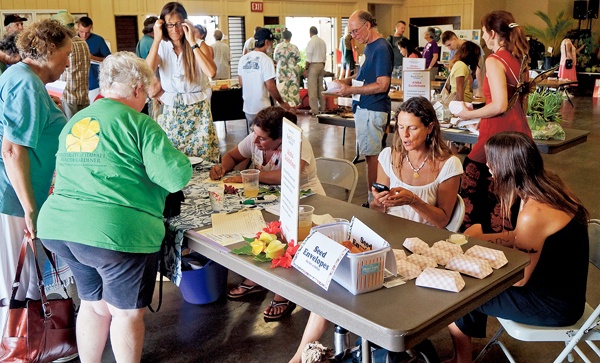LIHU‘E — Local organic farmers enjoyed a day of fellowship, trade and presentations Sunday at the 10th Kaua‘i Community Seed and Plant Exchange. Paul Massey, Kaua‘i Community Seed Bank manager and event coordinator, said the event focuses on GMO education
LIHU‘E — Local organic farmers enjoyed a day of fellowship, trade and presentations Sunday at the 10th Kaua‘i Community Seed and Plant Exchange.
Paul Massey, Kaua‘i Community Seed Bank manager and event coordinator, said the event focuses on GMO education and the impact to growers and to everyone as consumers. A primary concern was for cross-pollination of non-GMO crops, which in turn create another hybrid crop.
Presenters discussed the risk of local GMO contamination of corn and papaya seeds, as well as to rice, soy, sunflower and wheat.
“There is nothing can be done because they are doing this open-air testing on Kaua‘i,” said Massey. “We could get out there and bag our flowers and try to do all of these physical manipulations to keep the GMO pollen out but who has the time or the resources to do that.”
“It shouldn’t be the job of the organic (farmers) to stop the genetic pollution, it should be the job of the bio-tech companies to contain themselves,” said Jeri DiPietro of GMO-Free Kaua‘i. “That is the problem, and co-existence is impossible.”
DiPietro said her presentation focused on celebrating the 10th anniversary of GMO Kaua‘i, and that in all this time they have yet to see a long term studies or disclosure on GMO chemical spraying. She said the positive side is that there are more people now who are concerned about the importance of growing food locally and in a clean manner.
“What I do see happening is that people are becoming more aware about the ill-effect on health from living near these chemical experiments,” DiPietro said. “People on the Westside and the South Shore are beginning to come out of the woodwork to speak about the way this chemical drift and pesticide dust is impacting their health.”
DiPietro cautioned about the inherent danger of cross-genes constructs that act as viral promoters and possibly trigger disease when inhaled or consumed.
“We may never be able to grow food on the land that was contaminated but we can identify the non-contaminated lands and preserve them for local food production,” she said.
Jill Richardson, an organic grower in Kapahi, also volunteers for Regenerations Botanical Garden and is vice president of Kaua‘i Community Seed Bank. She said their work is to form a resilient seed movement.
“Without plant diversity we will no survive on this planet,” she said. “Having mono-crops is not the solution, plant diversity and empowering people to grow their own food is the solution.”
The more people rely less on corporations to feed them and their families the less this kind of thing will happen. Botanists are discovering more plants everyday.
Collin Dana, a volunteer who gardens on family land in Lawa‘i, said the green revolution started when scientists applied knowledge to create fertilizers and pesticides. He said they didn’t realize that plants have a symbiotic relationship with turn the microorganisms of its ecosystem.
“If you are applying chemicals in high amounts then you are killing microorganisms,” he said, “There is no longer an established relationship to the microorganisms.”
The Dust Bowl of the American Southwest in the 1930s was one result of intensive agriculture without knowledge of what the ecosystem needed to survive, he said.
“We basically just drained all of the fertility of the land and it just blew away,” Dana said.
Dana said people should look to food forests as an example of an ecosystem that has maintained itself for thousands of years. If we follow the GMO then nothing grows by itself, he said.
“People are the seeds and seeds are the people,” said event volunteer Robin Torquati.
Blake Drolson presented on the benefits of GMO-free food for health, preservation of traditional food sources, less green house gasses and transportation of food using oil.
“It’s an activism you can do without having to hold signs or go to the County Council,” Drolson said. “The nice thing is that the first thing that will happen is your health will improve, because you are eating better food, more nutritious foods and less poisons.”
The next events include a GMO awareness meeting at Caffé Coco on Oct. 23 at 6:30 p.m., and a “March Forth for Clean Food” by Lihu‘e airport on Oct. 25, from 3:30 to 5:30 p.m.
For more information call 651-9683 or visit online at gmofreekauai.org.
• Tom LaVenture, staff writer, can be reached at 245-3681 (ext. 224) or by emailing tlaventure@thegardenisland.com.


